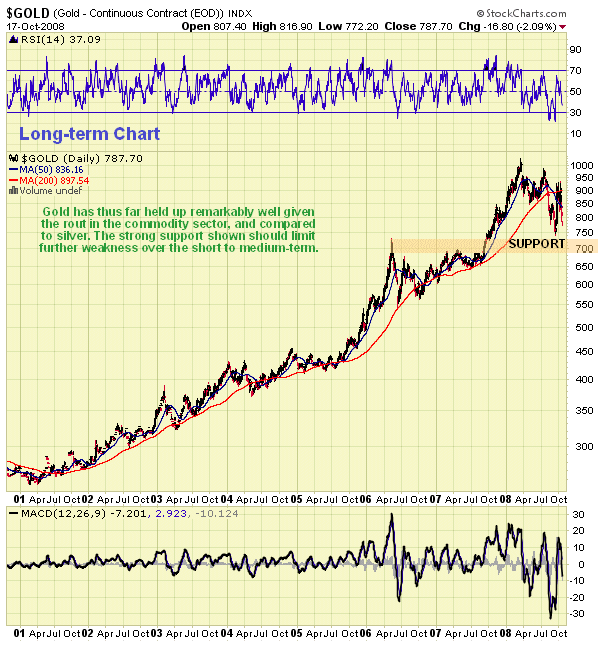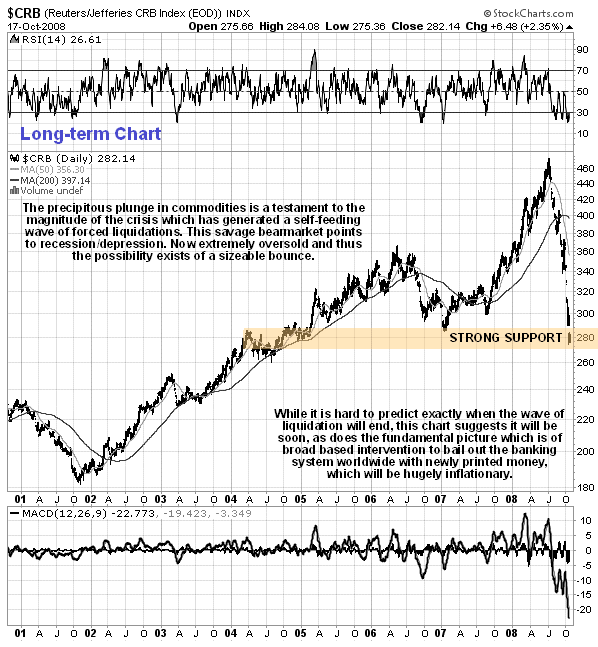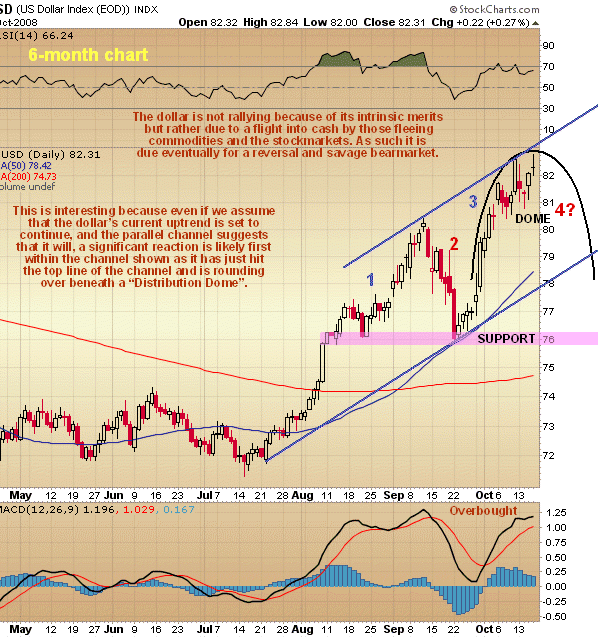Stocks and Commodities Collapse Due to Threat of Deflation
Commodities / CRB Index Oct 19, 2008 - 06:00 PM GMTBy: Clive_Maund

 The reason why commodities and stocks have been collapsing is liquidity problems and the consequent threat of deflation, and the collapse has been made far worse as a result of the extreme leveraging that had earlier been employed in the markets, which has resulted in a destructive vicious circle as each downleg triggered a fresh wave of selling as stops and margin calls kicked in.
The reason why commodities and stocks have been collapsing is liquidity problems and the consequent threat of deflation, and the collapse has been made far worse as a result of the extreme leveraging that had earlier been employed in the markets, which has resulted in a destructive vicious circle as each downleg triggered a fresh wave of selling as stops and margin calls kicked in.
The selling of commodities by commodity index funds has been broad-based and indiscriminate, due to client redemption requests, and this has resulted in heavy collateral damage across the board, with the "baby being thrown out with the bath water" as usual. At the heart of the problem is the banks' extreme reluctance to lend to one another, indicated by the high Libor rate which if should continue would of course result in a credit freeze and a depression. The underlying reason for banks' reluctance to lend to one another is perfectly understandable - they don't know if the banks they are lending to are even going to exist in the future and the difficulty of calculating counterparty risk is exacerbated by the trembling derivatives mountain with its labyrinthine web of liabilities, which has been destabilized by the collapse of Lehman Brothers.
Everyone has been taken aback by the speed and ferocity of the implosion and the initial response of politicians and business leaders, which was shambolic and piecemeal, failed to allay fears and arrest the decline. Thus coordinated global action has become necessary, which is what we are now witnessing. Desperate situations call for desperate measures and thus what might have seemed unthinkable a short time ago - extension regulation of the financial industry and widespread nationalization of banks is now looking inevitable. Awareness that a global banking collapse will rapidly lead to a return to the dark ages is a powerful motivating factor and politicians and governments are quickly coming to the conclusion that the only way out of this mess is to shore up banks and guarantee systemic liquidity.
Given the staggering losses accumulated in the banking system as a result of their reckless adventures, particularly in the realm of derivatives, it is clear that this will require massive infusions of capital. Where will this additional money come from? - it will be created out of nowhere electronically, in true Fiat tradition and the taxpayer will end up footing the bill, as usual, through greatly increased inflation. In the case of the United States, an attempt will be made to cover the debt by the increased sale of Treasuries, but it is likely that foreigners will be increasingly averse to taking them up.
The right course of action is not to intervene and to let the banks and Wall St pay the ultimate price for their greed and profligacy that have brought us to the current pass, and allow the system to implode which would cleanse it of the extreme distortions and excesses that have proliferated as the inevitable result of the unbridled expansion of Fiat.
This, however, is understandably regarded as an unacceptably painful course of action, particularly as it would doubtless involve widespread privation and consequent social unrest and could result in many political leaders losing their positions and possibly their lives. Since politicians are renowned for taking the line of least resistance, at least as far as it concerns them personally, it is easy to deduce which course of action they will select when presented with the options of either a deflationary implosion or a hyperinflationary bailout at public expense. It is of course the latter, and that is what they are currently getting together to organize. The Paulson Plan was for the hapless citizenry of the United States the first instalment that has "put the foot in the door" and will likely be the first of many such involuntary infusions.
So what will happen if the politicians' plans to bail out the banks and Wall St and stabilize the system at public expense succeeds? The amounts of money that will need to be created to achieve this are of course huge, and will be orders of magnitude greater if they attempt a solution to the derivatives mess, even assuming it is possible. Success of the plan therefore must lead inevitably to very high inflation or hyperinflation and probably an eventual bust anyway.
Assuming the Grand Rescue Plan goes ahead what will it mean for commodities and more particularly for gold? The massive infusions of newly created money that the plan calls for will feed through into huge inflation. In anticipation of this the forced commodity liquidation currently underway can be expected to abruptly stop and then go into reverse, so that prices climb steeply.
Gold will go through the roof. Silver, which is currently behaving as if it is not a Precious Metal at all, but an industrial metal, will take off as well in line with commodities as a whole, and as it typically performs best towards the end of gold up trends, can be expected to accelerate as the gold uptrend becomes mature. A sign that the forced liquidation has about run its course will be the dollar breaking down from its current strong uptrend - funds from liquidation of both commodities and stocks are being parked in the dollar and have bidded it up.
Turning now to the charts we see that gold has actually held up remarkably well in the recent past considering the rout in commodities generally, as made clear by the gold chart and the commodity chart being stacked one above the other below for easy comparison . On its long-term chart we can see that gold is still above a zone of strong support that should limit downside over the short to medium-term term to about $730 - $750.


With regard to timing when the forced liquidation of commodities has run its course, we should be able to use the US dollar index chart for guidance, as funds from the liquidation are clearly being parked in dollars. On the 6-month dollar index chart we can see that although the it is rounding over and now looks set to react back across its parallel uptrend channel, a final 5th upwave is then likely which will probably mark the end of the uptrend. In any event, a breakdown from the channel will open up downside risk and thus will likely coincide with a reversal of fortune in commodities.

By Clive Maund
CliveMaund.com
For billing & subscription questions: subscriptions@clivemaund.com
© 2008 Clive Maund - The above represents the opinion and analysis of Mr. Maund, based on data available to him, at the time of writing. Mr. Maunds opinions are his own, and are not a recommendation or an offer to buy or sell securities. No responsibility can be accepted for losses that may result as a consequence of trading on the basis of this analysis.
Mr. Maund is an independent analyst who receives no compensation of any kind from any groups, individuals or corporations mentioned in his reports. As trading and investing in any financial markets may involve serious risk of loss, Mr. Maund recommends that you consult with a qualified investment advisor, one licensed by appropriate regulatory agencies in your legal jurisdiction and do your own due diligence and research when making any kind of a transaction with financial ramifications.
Clive Maund Archive |
© 2005-2022 http://www.MarketOracle.co.uk - The Market Oracle is a FREE Daily Financial Markets Analysis & Forecasting online publication.


